
- Subject:
- Biology
- Material Type:
- Unit of Study
- Provider:
- Rice University
- Provider Set:
- OpenStax College


Biology is designed for multi-semester biology courses for science majors. It is grounded on an evolutionary basis and includes exciting features that highlight careers in the biological sciences and everyday applications of the concepts at hand. To meet the needs of today’s instructors and students, some content has been strategically condensed while maintaining the overall scope and coverage of traditional texts for this course. Instructors can customize the book, adapting it to the approach that works best in their classroom. Biology also includes an innovative art program that incorporates critical thinking and clicker questions to help students understand—and apply—key concepts.


By the end of this section, you will be able to do the following:
Identify the shared characteristics of the natural sciences
Summarize the steps of the scientific method
Compare inductive reasoning with deductive reasoning
Describe the goals of basic science and applied science

By the end of this section, you will be able to do the following:
Identify and describe the properties of life
Describe the levels of organization among living things
Recognize and interpret a phylogenetic tree
List examples of different subdisciplines in biology
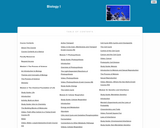
An introduction to biology intended for non-science majors. Focus areas include chemical foundations, cell structure and division, genetics, and evolution.
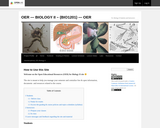
This site is an OER for BIology II and contains all the materials needed for the course including lecture slides and labs.
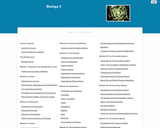
This template course was developed from generally available open educational resources (OER) in use at multiple institutions, drawing mostly from a primary work published by OpenStax College Concepts of Biology, but also including additional open works from various sources as noted in attributions on each page of materials.
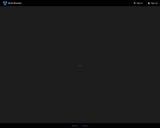
The full OpenStax Biology course, together with digital exercises that are repeated in an efficient way to help you achieve lifelong mastery in the subject material.
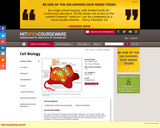
Biology of cells of higher organisms: structure, function, and biosynthesis of cellular membranes and organelles; cell growth and oncogenic transformation; transport, receptors and cell signaling; the cytoskeleton, the extracellular matrix, and cell movements; chromatin structure and RNA synthesis.
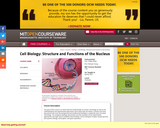
The goal of this course is to teach both the fundamentals of nuclear cell biology as well as the methodological and experimental approaches upon which they are based. Lectures and class discussions will cover the background and fundamental findings in a particular area of nuclear cell biology. The assigned readings will provide concrete examples of the experimental approaches and logic used to establish these findings. Some examples of topics include genome and systems biology, transcription, and gene expression.
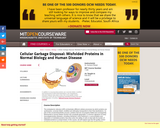
The endoplasmic reticulum (ER) orchestrates different cellular processes by which proteins are synthesized, correctly folded, modified and ultimately transported to their final destinations. As part of this crucial biosynthetic process, proteins that are not properly folded and consequently detrimental to normal cellular function are constantly generated. A common signature of many neurodegenerative diseases, including Alzheimer's and Parkinson's, is accumulation and deposition of misfolded proteins that arise when the ability of cells to deal with the burden of misfolded proteins is compromised. In this course, we will explore how the ER quality control machinery ensures that only properly assembled proteins exit the ER while distinguishing between nascent proteins en route to their biologically active folded state from those that are terminally misfolded.
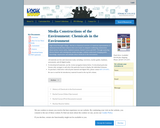
This kit is a historical overview of American representations of chemicals from the three sisters to the Love Canal. It compares conflicting constructions about nuclear reactor safety, depleted uranium, Rachel Carson and DDT. Through analyzing diverse historic and contemporary media messages, students understand changing public knowledge, impressions and attitudes about chemicals in the environment.
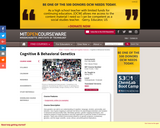
How genetics can add to our understanding of cognition, language, emotion, personality, and behavior. Use of gene mapping to estimate risk factors for psychological disorders and variation in behavioral and personality traits. Mendelian genetics, genetic mapping techniques, and statistical analysis of large populations and their application to particular studies in behavioral genetics. Topics also include environmental influence on genetic programs, evolutionary genetics, and the larger scientific, social, ethical, and philosophical implications.
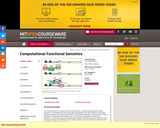
Study and discussion of computational approaches and algorithms for contemporary problems in functional genomics. Topics include DNA chip design, experimental data normalization, expression data representation standards, proteomics, gene clustering, self-organizing maps, Boolean networks, statistical graph models, Bayesian network models, continuous dynamic models, statistical metrics for model validation, model elaboration, experiment planning, and the computational complexity of functional genomics problems.
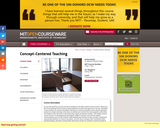
Used for students receiving Advanced Placement credit and transfer credit. Program of study or research to be arranged with a Department faculty member. Written report required. Permission of Department required.
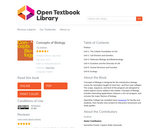
Concepts of Biology is designed for the introductory biology course for nonmajors taught at most two- and four-year colleges. The scope, sequence, and level of the program are designed to match typical course syllabi in the market. Concepts of Biology includes interesting applications, features a rich art program, and conveys the major themes of biology.
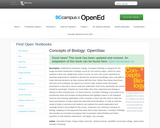
Concepts of Biology is designed for the single-semester introduction to biology course for non-science majors, which for many students is their only college-level science course. As such, this course represents an important opportunity for students to develop the necessary knowledge, tools, and skills to make informed decisions as they continue with their lives. Rather than being mired down with facts and vocabulary, the typical non-science major student needs information presented in a way that is easy to read and understand. Even more importantly, the content should be meaningful. Students do much better when they understand why biology is relevant to their everyday lives. For these reasons, Concepts of Biology is grounded on an evolutionary basis and includes exciting features that highlight careers in the biological sciences and everyday applications of the concepts at hand. We also strive to show the interconnectedness of topics within this extremely broad discipline. In order to meet the needs of todays instructors and students, we maintain the overall organization and coverage found in most syllabi for this course. Instructors can customize Concepts of Biology, adapting it to the approach that works best in their classroom. Concepts of Biology also includes an innovative art program that incorporates critical thinking and clicker questions to help students understandand applykey concepts.
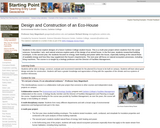
This interdisciplinary course is a real-world collaborative multi-year project that connects various departments, courses, and independent study projects on a college campus. Using the client/consultant model, students from several departments and a wide range of environmental backgrounds come together to explore the design of an efficient future student house on campus. Over a couple of years, students research and test building designs, energy for heating and power, natural flows of available energy, natural ecosystem processes including living machines, and possible materials to use in the eventual construction of the eco-house. This SERC Starting Point site includes learning goals, context for use, teaching tips and materials, assessment, and references.